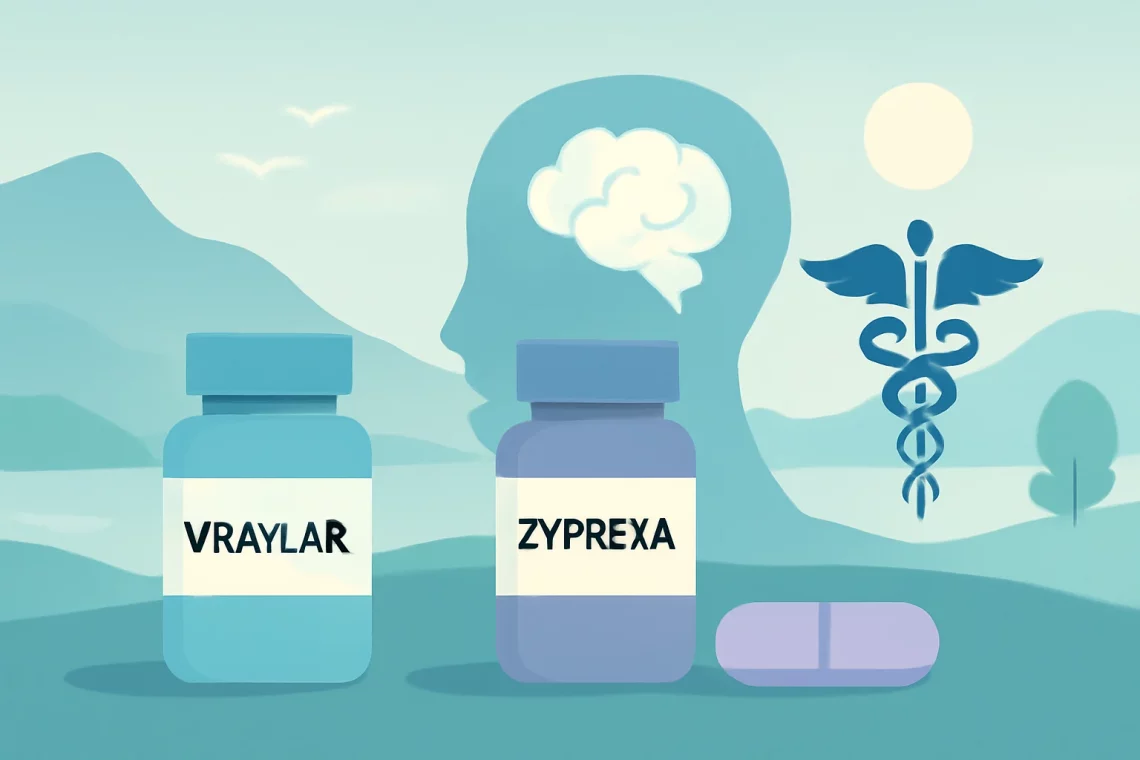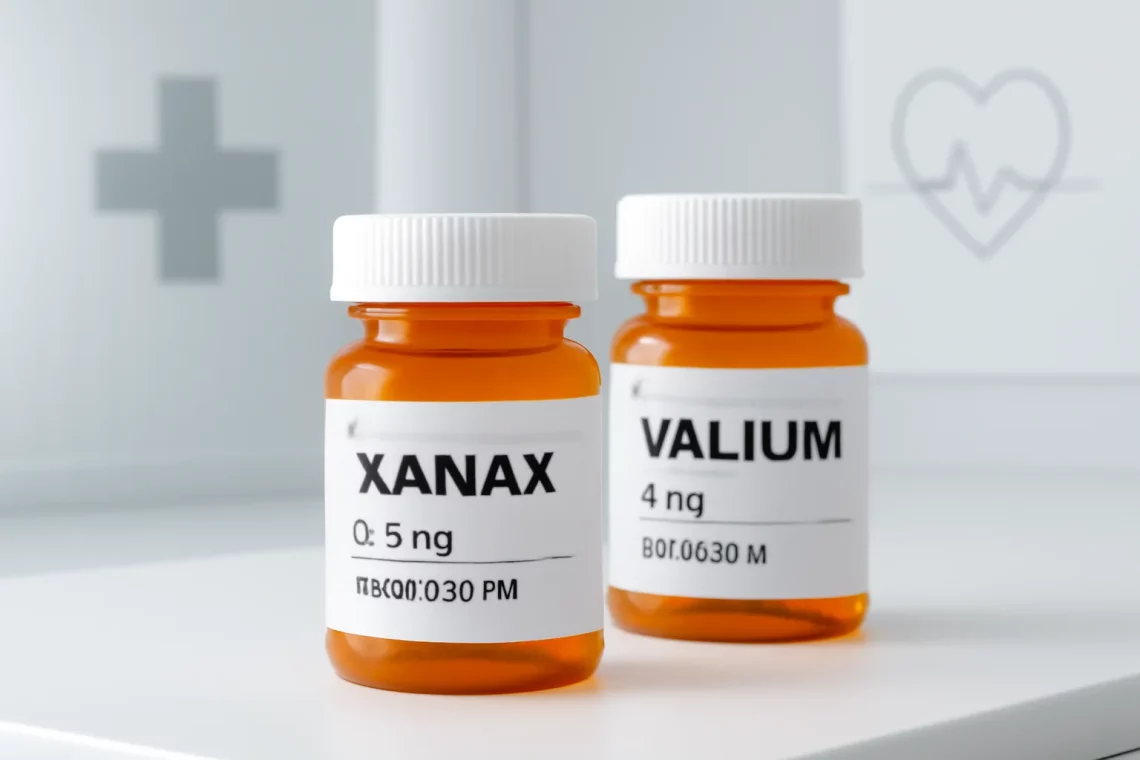-
Xanax vs Vistaril: Understanding Their Uses and Differences
Anxiety and panic disorders have become increasingly common in today’s fast-paced world, leading many individuals to seek relief through medication. Among the various treatments available, Xanax and Vistaril are two medications frequently discussed in the context of anxiety management. Both have unique properties and mechanisms of action, making them suitable for different patient needs and circumstances. Xanax, a well-known benzodiazepine, is primarily prescribed for the treatment of anxiety disorders and panic attacks. It works by enhancing the effects of a neurotransmitter called gamma-aminobutyric acid (GABA), which helps to calm excessive brain activity. On the other hand, Vistaril, an antihistamine with anxiolytic properties, is often used not only for anxiety but…
-
Ativan vs Buspar: Comparing Anxiety Medications and Their Effects
Ativan and Buspar are two medications commonly prescribed for anxiety and related disorders. While they are both used to alleviate symptoms of anxiety, they belong to different classes of drugs and have distinct mechanisms of action, side effects, and usage considerations. Understanding the differences between these two medications can help patients make informed decisions about their treatment options. Ativan, known generically as lorazepam, is a benzodiazepine that works by enhancing the effects of a neurotransmitter called gamma-aminobutyric acid (GABA) in the brain. This results in a calming effect, which can help reduce feelings of anxiety and promote relaxation. On the other hand, Buspar, or buspirone, is an anxiolytic that does…
-
Clonazepam vs Diazepam: Which Medication is Right for You?
Clonazepam and diazepam are two medications that fall under the category of benzodiazepines, a class of drugs commonly prescribed for their sedative, anxiolytic, and muscle-relaxant properties. These medications have been widely used in the treatment of various conditions, including anxiety disorders, panic attacks, and seizures. Despite their similarities, clonazepam and diazepam have distinct differences in their pharmacological profiles, indications, and side effects, which can influence the choice of one over the other in clinical practice. Understanding these differences is essential for patients and healthcare professionals alike, as it can guide effective treatment strategies tailored to individual needs. Both medications work by enhancing the effects of a neurotransmitter called gamma-aminobutyric acid…
-
Lexapro vs Effexor XR: Choosing the Right Antidepressant for You
Lexapro and Effexor XR are two commonly prescribed medications for the treatment of mood disorders, particularly depression and anxiety. As mental health awareness continues to grow, so does the interest in understanding the various options available for managing these conditions. These medications belong to different classes of antidepressants, each with its unique mechanisms of action, side effects, and benefits. In today’s fast-paced world, many individuals seek effective treatment options to help them cope with the challenges of daily life. The choice between Lexapro and Effexor XR can significantly impact a patient’s journey toward mental wellness. Understanding the differences and similarities between these two medications is essential for making informed decisions…
-
Lexapro vs Wellbutrin: Choosing the Right Antidepressant for You
The landscape of mental health medications is broad and diverse, with various options available to help individuals manage their conditions. Among these, Lexapro and Wellbutrin stand out as popular choices for treating depression and anxiety. While both medications aim to alleviate symptoms of mood disorders, they belong to different classes of antidepressants and work through distinct mechanisms in the brain. Understanding the nuances of these medications can empower patients and their healthcare providers to make informed decisions about treatment options. As mental health continues to gain recognition, it is essential to explore the efficacy, side effects, and overall patient experience associated with different medications. Each person’s journey with mental health…
-
Vraylar vs Zyprexa: A Comprehensive Comparison of Two Antipsychotics
Mental health issues have become increasingly prevalent in today’s society, prompting a growing need for effective treatment options. Among the various medications available for managing conditions such as schizophrenia and bipolar disorder, Vraylar and Zyprexa stand out as popular choices. These medications belong to a class known as atypical antipsychotics, which are designed to address the symptoms often associated with these mental health disorders. Understanding the differences between Vraylar and Zyprexa is crucial for patients, caregivers, and healthcare professionals alike. Each medication has its unique mechanism of action, side effects, and efficacy profiles, making it essential to evaluate them carefully in the context of individual patient needs. In this discussion,…
-
Buspirone vs Hydroxyzine: Which Anxiety Medication is Right for You?
In the realm of mental health and anxiety management, medication plays a crucial role for many individuals seeking relief from their symptoms. Among the various options available, Buspirone and Hydroxyzine are two medications often discussed for their effectiveness in treating anxiety-related conditions. While both belong to the broader category of anxiolytics, they differ significantly in their mechanisms of action, side effects, and overall use cases. Understanding these differences is vital for anyone considering treatment options for anxiety or related disorders. Both medications offer unique benefits and potential drawbacks, making it essential for individuals to evaluate their personal health needs and consult with healthcare professionals. The choice between Buspirone and Hydroxyzine…
-
Xanax vs Valium: Understanding the Differences and Uses
The use of benzodiazepines has become increasingly prevalent in modern medicine, particularly for the treatment of anxiety and panic disorders. Two of the most commonly prescribed medications in this category are Xanax and Valium. Both of these drugs are known for their effectiveness in alleviating symptoms of anxiety, but they possess unique properties that set them apart. As the understanding of mental health continues to evolve, it is essential to examine these medications closely to determine which may be more appropriate for various conditions. In the realm of mental health treatment, the importance of medication cannot be overstated. Patients often seek relief from overwhelming feelings of anxiety, panic, or stress,…
-
Lamotrigine vs Topiramate: Choosing the Right Medication for You
Lamotrigine and Topiramate are two medications commonly used in the management of neurological disorders, particularly epilepsy and bipolar disorder. As the understanding of these conditions has evolved, so too have the treatment methodologies, leading to the development of diverse pharmacological options. Both Lamotrigine and Topiramate belong to a class of drugs known as anticonvulsants, but they have unique mechanisms of action, side effect profiles, and indications that can influence a clinician’s choice when prescribing for their patients. Patients and healthcare providers alike are often faced with decisions about which medication to choose, weighing factors such as efficacy, side effects, and individual patient needs. Understanding the nuances of each medication is…
-
Amitriptyline vs Nortriptyline: Choosing the Right Antidepressant
Amitriptyline and Nortriptyline are two medications that have garnered attention in the field of mental health and pain management. Both drugs belong to a class known as tricyclic antidepressants (TCAs), which were among the first types of antidepressants developed. Despite their similar origins, these two medications have distinct properties, uses, and side effects that make them suitable for various patient needs. Understanding the differences and similarities between Amitriptyline and Nortriptyline can be crucial for patients and healthcare providers alike. As mental health awareness continues to rise, more individuals seek effective treatments for conditions such as depression, anxiety, and chronic pain. These medications are often considered as part of a comprehensive…







































